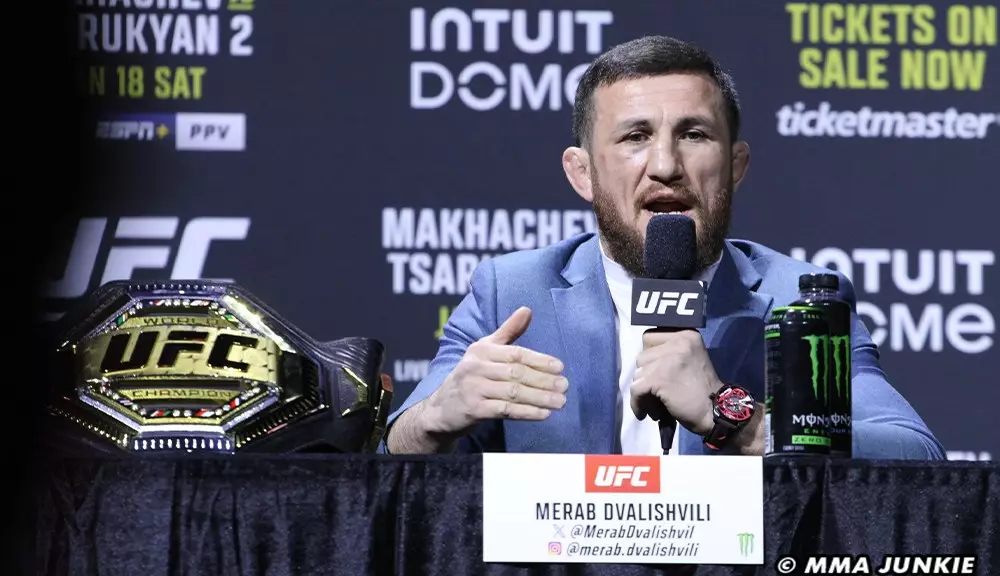As the UFC world gears up for the highly anticipated co-main event at UFC 311 on January 18, bantamweight champion Merab Dvalishvili finds himself in an unexpected position. Rather than focusing solely on his first title defense against undefeated challenger Umar Nurmagomedov, Dvalishvili is embroiled in a war of words that has heated up in the weeks leading to the showdown at the Intuit Dome in Inglewood, California. With a respectable fight record of 18-4 and an 11-2 standing in the UFC, Dvalishvili has proven himself a formidable talent in the octagon. However, the pressure leading to this title defense has amplified to a boiling point thanks to Nurmagomedov’s relentless provocations.
Nurmagomedov’s tactics have crossed the line from mere competition to personal attacks, accusing Dvalishvili of cowardice and disrespecting his capabilities. As the two fighters exchanged verbal jabs during the pre-fight press conference, it became clear that Dvalishvili had reached his breaking point. The champion asserted that he demands an apology from Nurmagomedov, citing principles of respect and honor that he holds dear. In an era where trash talk is a common promotional tool within mixed martial arts, Dvalishvili’s need for mutual respect stands out starkly, suggesting a level of seriousness and personal conviction usually overshadowed by bravado.
The intensity of Dvalishvili’s emotions was evident when he made it clear that the championship title no longer mattered to him in the face of what he perceives as disrespect. He remarked, “I don’t care about this belt. I don’t care about this money. I don’t care about this legacy.” Such statements from a champion are compelling—they expose the complex psychology behind competitive sports. For Dvalishvili, this isn’t just a belt on the line; it’s about his integrity and self-respect as a fighter. The conversations we’ve had with champions often reveal a clear delineation between professional pride and personal principles. Dvalishvili embodies the sentiment of putting personal honor above career accolades, which resonates with fans as it dispels the sometimes superficial nature of combat sports.
The tumultuous atmosphere surrounding Dvalishvili escalated during his involvement at UFC 310, where he was confronted by a fan during a teammate’s post-fight celebration. The emotional turmoil expressed by Dvalishvili after the altercation reflects not just a singular experience but serves as an alarm bell for the mental state of fighters who endure extreme emotional stress. It warrants discussion on how external distractions can affect a fighter’s performance, particularly when they encounter challenging circumstances even outside the octagon.
Dvalishvili claimed that Nurmagomedov’s team may have provoked the incident, highlighting how rivalries can stretch beyond mere verbal exchanges and into the personal lives of fighters. This ongoing tension raises critical questions about the role of team dynamics and how they can influence fighter focus in critical moments.
Dvalishvili’s willingness to address potential post-fight repercussions reveals his heated emotional state. He warns that if respect is not given, there would be consequences, stating, “He may get a slap after the fight.” Such declarations could be interpreted either as bravado or as a genuine indication of the seriousness he attaches to respect within the sport. The implications of these sentiments extend beyond the outcome of the match; they could significantly affect fan perceptions and media narratives moving forward.
With his loyalty and respect for the Dagestani culture maintained despite the conflict with Nurmagomedov, it appears that Dvalishvili is striving for a balance between cultural respect and personal integrity. The champion’s affinity for Dagestan and its people adds layers to the rivalry, fostering curiosity about how this dynamic might play out post-fight.
As the countdown to UFC 311 continues, Merab Dvalishvili stands at a crossroads. He not only seeks to defend his title against an undefeated opponent but also attempts to navigate the turbulent waters of personal respect and competitive rivalry. The match promises to be a blend of skill, cunning, and underlying personal narratives, which makes it one to watch closely. Dvalishvili’s journey underscores the need for respect in the unforgiving world of mixed martial arts, leading us to wonder: what lies ahead both inside and outside the octagon?

